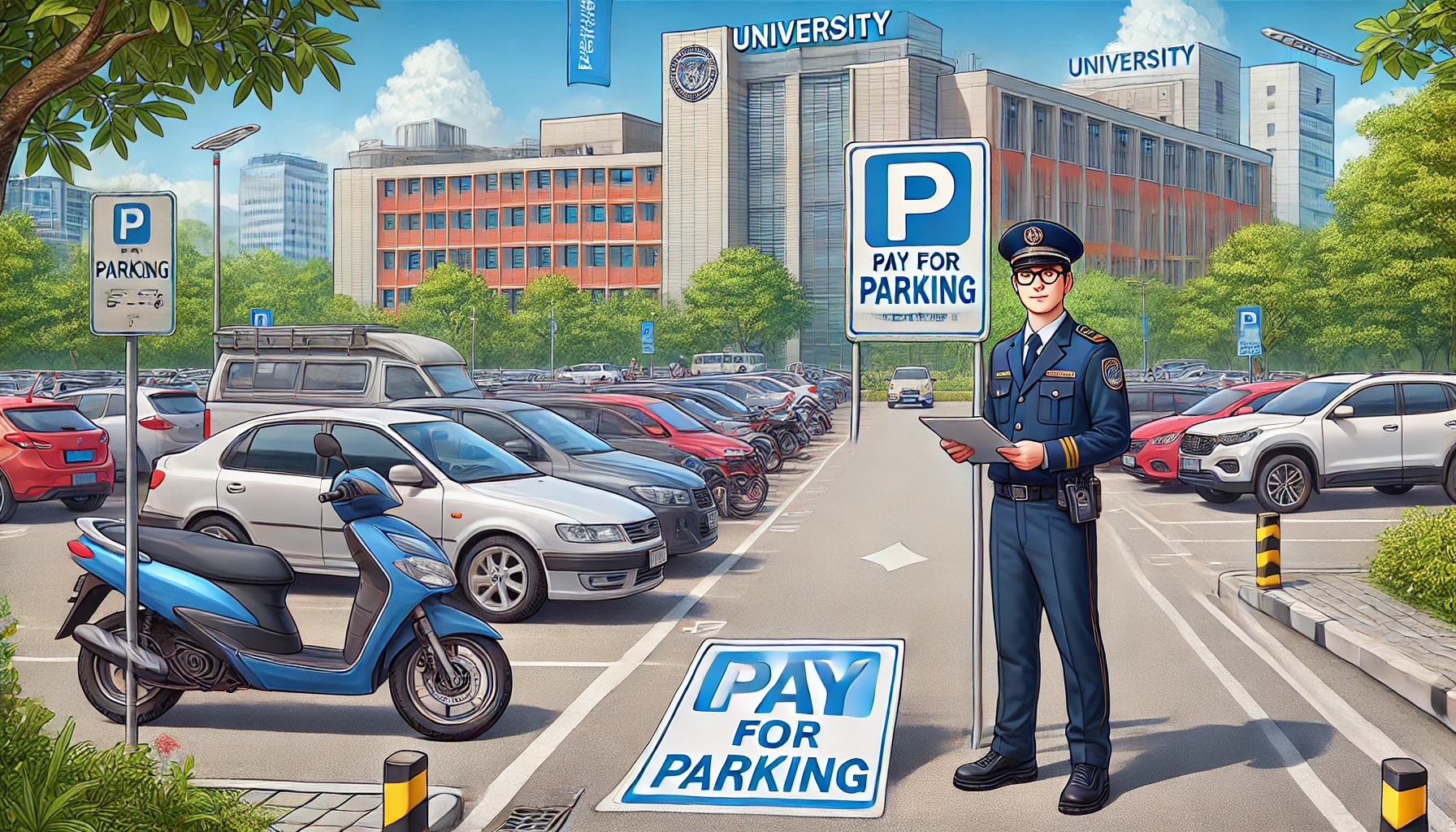Why Do Students Have to Pay for Parking?_ Deep Insights and 4 Valuable Alternative Suggestions to Universities
“Why do students have to pay for parking?” is a question that resonates powerfully with students across the globe, and connects to matters of fairness, affordability and campus access. For many, parking fees are an additional financial stressor on top of tuition, housing and other school-related expenses, making this topic relevant to their everyday lives. It raises the question whether it is an individual question or a universal question: how to balance between the needs of an institution and the welfare of a student. This topic allows us to have a discussion about transparency in a meaningful way exploring this topic.
Table of Contents
Parking System of Few Renowned Universities
Parking fees at universities is a matter of concern for the students. It has been seen that renowned and famous universities also charge students for parking at higher cost that puts them in trouble.
Below are parking fee structures of some of the famous and well-known universities:
The University of Melbourne vary by day and time.
- Weekdays: $12.50 for 4 hours, $25 for all day, and $10 after 5 PM
- Weekends and public holidays: $10 after 5 PM
The University of California, Los Angeles (UCLA) charges parking fees based on location and time. Day rates range from $4 to $30, depending on the lot and duration, with most parking fees collected via self-service pay stations or the Bruin ePermit system. Accessible parking is available with a UCLA permit and a DMV placard. Weekend rates match weekday rates, and all-day parking is subject to availability.
The University of Texas at Austin’s parking fees vary by type and duration. Garage parking ranges from $12 for 3–4 hours to $18 for up to 24 hours, while metered parking costs $1 per 15 minutes or $1 per hour after hours. Student permits range from $174 to $997 annually, depending on the class and dorm. Accessible parking is free with a valid disabled hangtag, and event parking rates apply during events.
Parking fees at the University of Cambridge vary by location and duration. Rates at the University Place Garage range from $6–$32 daily, with a student rate of $235 and monthly rates from $210–$465. On-street parking costs £1–3 per hour, while nearby parking starts at £13.20 on JustPark. Parking at the Sports Centre is free, while Grafton East and Park Street charge £2.30–£28.30, offering free parking for Blue Badge holders for the first 3 hours.
Why do Students Have To Pay for Parking?: Universities’ Arguments
Universities give a lot of reasons to answer this very question “Why do Students Have to Pay for Parking”.
- College students across the nation tend to pay for parking fees to hold up the expenses of maintaining parking lots and structures. These costs could include routine repairs, cleaning, and adequate lighting to ensure safety and accessibility.
- This includes the utilization of security personnel, surveillance systems, and emergency communication devices to provide a safe environment for both students and their vehicles.
- These fees also contribute to revenue generation that can be used for reinvestment in other campus needs, including academic facility improvements, scholarship funding, or maintaining other critical infrastructure
- Universities argue that they need these fees to help with the long-term sustainability of their parking infrastructure and keeping the balance between too many students and not enough spaces.
- They also hope that by implementing fees, they’ll dissuade drivers from parking when they don’t need to and encourage alternative transportation methods, such as biking, public transit or carpooling,which align with sustainability goals.


Criticism of Student Parking Fees
- However, there is significant criticism of student parking fees. Many students claim that the fees are an unfair burden, especially when they already have to pay high tuition costs.
- Parking fees become possibly unaffordable for the students living in rural areas as they have limited driving alternatives.
- Additionally, some believe that institutions benefit unduly from parking costs without providing adequate places or inexpensive options for students, leading to a sense of exploitation.
- Another source of criticism is the lack of transparency in how parking earnings are used, with students asking whether the fees are genuinely reinvested in campus upgrades. That is why they always want to get the answer of “Why do Students Have to Pay for Parking”.
Examples of Few Ideal Universities’ Parking System
Here are a few examples of universities that offer free or subsidized parking, which can help alleviate the financial burden for students, particularly those from rural areas:
- University of Iowa (USA):
The University of Iowa offers free parking for students in certain lots, particularly for those who commute from rural areas or off-campus. They also provide discounted rates for students who live on campus. - University of North Carolina at Chapel Hill (USA):
Some parking lots on the UNC-Chapel Hill campus are free for students, especially those with disabilities or commuting from certain distances. They also have affordable permit options for students who need regular access. - University of Otago (New Zealand):
The University of Otago provides affordable parking permits for students, with subsidized rates in comparison to commercial parking options. They also offer some free parking areas near student accommodation. - University of Alberta (Canada):
At the University of Alberta, certain parking lots are free or low-cost for students, particularly for those who park further from the campus and rely on public transit or carpooling. - University of Birmingham (UK):
The University of Birmingham offers subsidized parking rates for students with specific needs, such as those who have a long commute or require special accommodations.
These universities aim to support students who face unique challenges in accessing campus, particularly those from rural or remote areas and they’re probably the reasons students from different universities across the world keep asking their university administration the very question, “Why do Students have to Pay for Parking?”.
Innovative Approaches for Both Students and Universities
Considering the challenges of parking fees, many universities are experimenting innovative approaches that can benefit both students and the environment.
- One effective solution is to implement parking passes or tiered pricing systems, which allow students to select from a variety of options based on their needs, such as discounted permits for long-term parking or flexible passes for occasional use. This makes parking spaces more inexpensive and easier to manage.
- Furthermore, universities can encourage green transportation by providing reduced parking prices or preferential parking locations for students who drive electric vehicles, carpool, or bike to campus.These strategies not only reduce parking congestion, but also promote environmentally friendly transportation options, benefiting both students and the planet.

Solutions And Alternatives for Universities for Better Parking System
To solve the issue of expensive parking fees, universities should consider introducing many ideas and alternatives that assist students, particularly those with financial constraints:
- Free or Reduced Parking Fees for Low-Income Students: Universities should Offer free or discounted parking for students from low-income backgrounds. This would ensure that they are not further burdened by unnecessary costs.
- More Efficient Use of Parking Spaces: Available Spaces can be increased by Implementing shared or reserved parking systems. This can help students who truly need them without having to pay excessive fees.
- Promotion of Public Transport or Cycling: If proper infrastructure is provided to the students, such as discounted transit passes, bike racks, and safe pathways, it can encourage the students for the use of public transportation or cycling ultimately reducing the reliance on personal vehicles and easing parking congestion.
- Flexible or Pay-Per-Use Models: Introducing flexible or pay-per-use parking models would allow students to pay only for the time they use, making parking more affordable for those who don’t need to park every day.
These solutions can help strike a balance between maintaining campus infrastructure and ensuring students have affordable and convenient access to parking.
Practical Pieces of Advice for Students to Manage their Finances and Navigate Campus Parking Efficiently
- Carpool or Share Rides: Share rides with students who live nearby or have similar schedules to lessen vehicle traffic on campus. Carpooling not only saves money on parking and petrol, but it also reduces your carbon footprint.
- Use Student Parking Permits: Purchase an annual parking pass to save money compared to daily parking fees. Compare permit alternatives to see which one best suits your commute habits, and buy early to prevent last-minute price increases.
- Use Public Transportation: Many institutions provide cheap or free transit passes to students. Taking public transportation can help you save money on parking and relieve the stress of driving around looking for a spot.
- Plan Your Parking: If driving, schedule your arrival hours intelligently. Arriving early can help you acquire a place in a cheaper lot or a more convenient location, saving you both time and money.
- Consider Bicycle Options: Cycling to campus is a cheap and environmentally good option. Invest in a sturdy bike lock and use campus bike racks to avoid parking fees entirely.
- Look for Off-Campus Parking Deals: Check to see if there are any economical parking lots nearby that may provide better prices than campus parking. Some cities and areas offer cheap student parking.
- Apply for Parking Fee Waivers or Discounts: Some colleges provide reduced or discounted parking costs for students experiencing financial difficulty or exceptional circumstances. Please do not hesitate to inquire about these opportunities.
- Use Parking Apps: Some universities provide apps or third-party services that allow you to track available parking spaces and pay via mobile, reducing time spent seeking for spots and potentially overpaying.
By utilizing these strategies, students can reduce the financial strain of parking and better manage their overall expenses.
FAQs:
Why do Universities charge students for parking?
Universities argue that they need these fees to help with the long-term sustainability of their parking infrastructure and keeping the balance between too many students and not enough spaces.College students across the nation tend to pay for parking fees to hold up the expenses of maintaining parking lots and structures. These costs could include routine repairs, cleaning, and adequate lighting to ensure safety and accessibility.
How are parking fees typically used by universities?
This includes the utilization of security personnel, surveillance systems, and emergency communication devices to provide a safe environment for both students and their vehicles.
Is parking free at any university or college?
Many universities across the world either have free parking or they charge very less to their students that is affordable for them. Some of these leading and well-known universities are University of Iowa (USA), University of Birmingham (UK), University of Alberta (Canada), and University of North Carolina at Chapel Hill (USA)
What are the Penalties for not paying for parking on Campus?
What Are the Penalties for Not Paying for Parking on Campus?
Penalties for not paying for campus parking often include fines, vehicle towing, or wheel clamping. Repeated violations may result in permit revocation or holds on student accounts, restricting access to grades or registration. These measures ensure compliance with parking policies.


